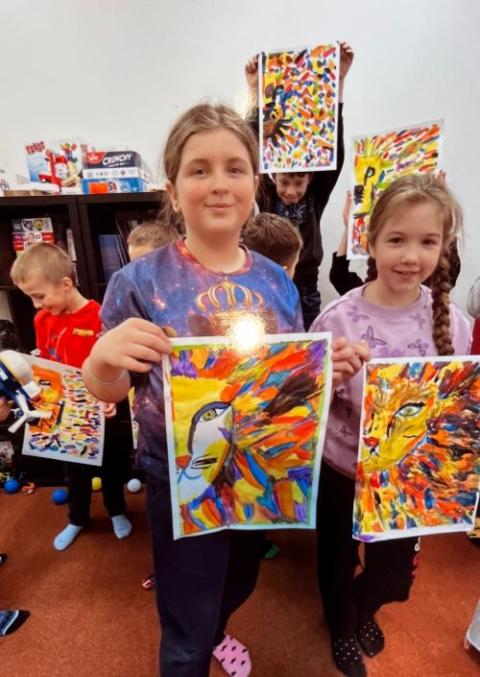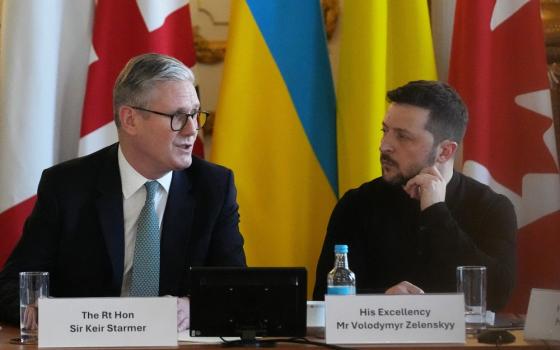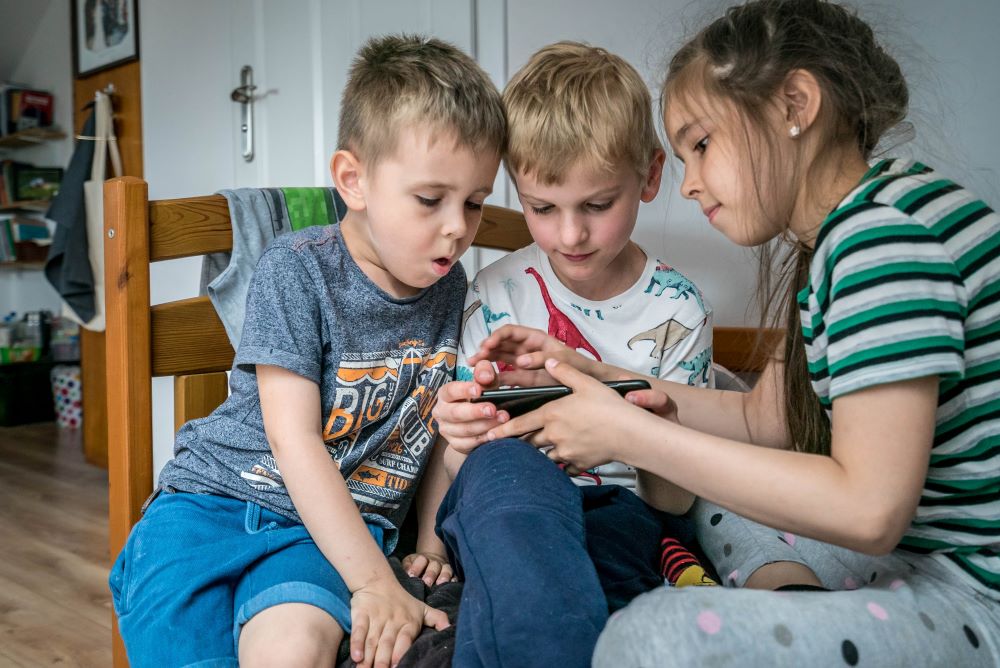
Stanislav Tereshchenko, 5, Janek Sulkowski, 8, and Anastasia Tereshchenko, 9, play Minecraft on a portable tablet at the home of Olga and Mariusz Sulkowski in Otwock, Poland, May 21, 2022. (CNS photo/Lisa Johnston)
Editor's note: NCR board member David Bonior and contributor Fr. Peter Daly traveled to Ukraine and Poland in March. This is the second report from that trip. The first piece, written by Bonior, looked at "The indomitable spirit of the Ukrainian and Polish people."
Over the last 20 years there have been many reasons to be discouraged about the Catholic Church. But in Poland, we saw spectacular acts of charity and mercy that should make all Catholics proud of the witness of our church.
Poland is a country with a population of about 38 million people. Since the full-scale Russian invasion in February 2022, about 11.8 million Ukrainian refugees crossed the border into Poland, according to Statistica.
Not all have stayed in Poland. Some returned to Ukraine when things settled down in some areas. Others went onward to other European Union countries. The U.S. has admitted about 271,000 Ukrainian refugees.
But more than 1.6 million Ukrainian refugees have decided to remain in Poland. That is an overwhelming burden on a relatively small country. But Poland has risen to the challenge.
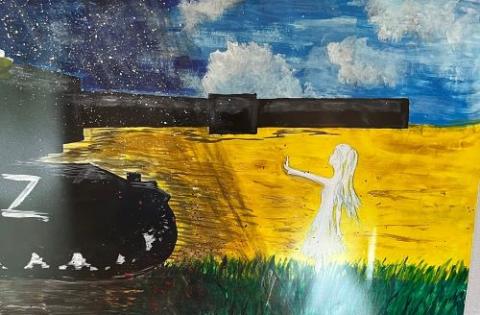
This drawing, which depicts a child, with angel wings and holding a cross, stopping a Russian tank, hangs at the Caritas offices in Warsaw, Poland. (David Bonior)
The Polish government deserves a lot of credit. They have given the Ukrainian refugees temporary legal status, health service cards, schooling, housing assistance subsidies, work permits and all other Polish social services. They even allowed Ukrainians to travel free on trains (second class), suspended COVID restrictions, and allowed Ukrainians to enter without passports and with their pets.
But the Polish Catholic Church has also risen to the challenge. The Polish government and the Polish churches (of every denomination) were like dancing partners: The government provided legal and financial resources and the churches provided the volunteers — the "hands and the heart."
After the government, the Catholic Church is the only national institution that extends into every Polish city and village. Through its charitable arm, Caritas Poland, the church has set up 32 refugee reception centers, scattered throughout the country. All Poland's 42 dioceses and 10,000 parishes have been involved in the refugee effort.
A sign on the office of Caritas at the train station in the Polish border town of Przemysl instructs Ukrainian refugees, especially women, on how to avoid becoming victims of trafficking or falling into the clutches of unscrupulous people in this April 21, 2022, photo. (CNS/Cindy Wooden)
The most remarkable thing about the refugee story in Poland is that all the refugees have been housed in Polish homes and apartments, convents, monasteries, retreat houses and shelters. No refugee camps. No tent cities. Our guides told us that there are no empty apartments in cities in the east of Poland, closest to the Ukrainian border.
|
The Ukrainian influx is mostly women and children. Men ages 18 to 60 are not allowed to leave Ukraine, as they are likely to be drafted into the military. Many Ukrainian refugees in Poland are senior citizens. A significant percentage are also disabled. Hospitals in Ukraine cannot care for people with disabilities in the midst of war. Our first stop on our two-week visit to Poland and Ukraine was at the Caritas national office in Warsaw. There we met Fr. Marcin Izycki, director of Caritas Poland, and Malgorzata Jarosz-Jarszewska and Ireneusz Krause, managers of the Caritas refugee response. We also met with Britton Buckner, the in-country representative of the U.S.-based Catholic Relief Services. Izycki said that after a year of frenzied work, the Caritas workers are very tired. "We have been overwhelmed," he said. "But this is our Christian duty, even if we feel overwhelmed. This is our mission, like the good Samaritan." |
'We were here before the war. We will be here after the war.'
—Fr. Marcin Izycki
He quoted Pope Benedict XVI, who said the three duties of the church are to preach the Gospel, celebrate the sacraments and do works of charity.
Izycki was in Ukraine when Russia invaded on Feb. 24, 2022. He had to walk back to the Polish border from the western Ukrainian city of Lviv, a distance of about 50 miles. The roads were completely clogged with cars fleeing the war. Even as he walked, he was on his cellphone making arrangements for meals to be served to refugees at the border. In one border crossing town that we visited, Przemyśl, Caritas served more than 40,000 hot meals per day to refugees at the height of the crisis in March 2022, Izycki said. Other groups offered food there as well, like World Central Kitchen, run by chef José Andrés.
Izycki said that the Polish Catholic community realizes that Russia might not stop at the Ukrainian border. "We could be next," he said.
American Catholics have also been involved in the Ukrainian refugee effort in Poland. Buckner told us that American Catholics devoted more than $100 million to the refugee effort in Poland and other Eastern European countries. I think it will be hard to maintain that level of effort if the war drags on for a long time.
At 32 Caritas refugee assistance centers in Poland the church offers translation services and language classes, help with documents and paperwork, child care for women who must look for jobs or go to work, art therapy and counseling for children traumatized by the war, and trauma counseling to families who have lost nearly everything, including loved ones.
The refugee centers also provide programs for Ukrainian seniors. One social worker told us that no matter the weather, Ukrainian seniors show up for all the programs, so eager are they for social support. They go hiking in the ice and snow. We were told that many seniors do not want individual psychological counseling. They prefer the mutual support of groups of Ukrainian refugees who understand their loss and their depression.
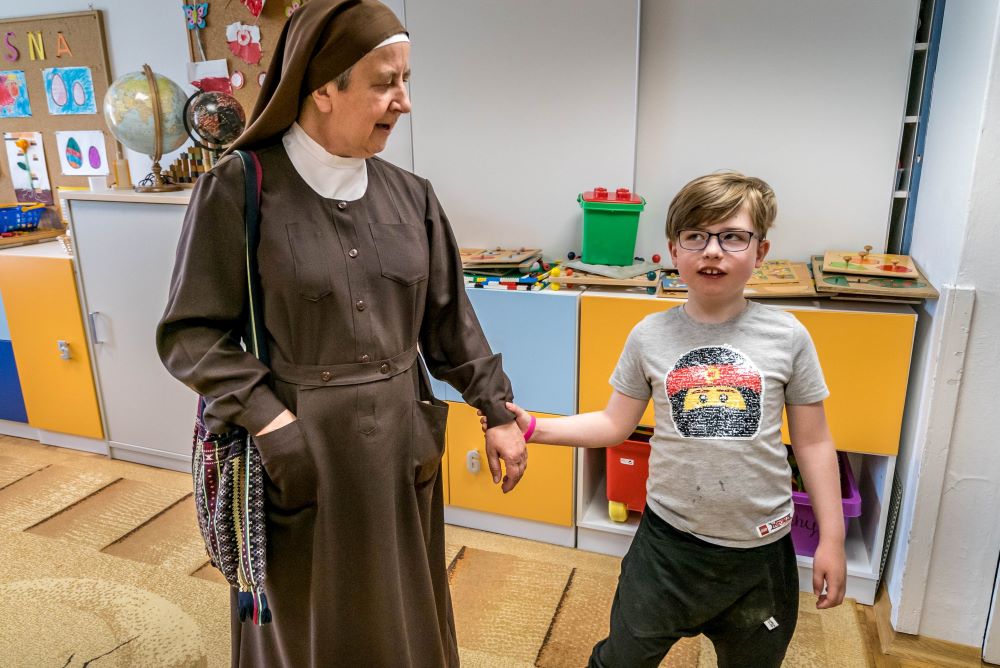
Sister Angelica of the Franciscan Sisters Servants of the Cross talks with a visually impaired refugee student from Ukraine at their monastery in Laski, Poland, in this May 20, 2022, photo. (CNS photo/Lisa Johnston)
Many seniors have lost everything. The parents of our translator in Poland, Olesia Voitsekhovska, are a typical example. When the Russians invaded their town in the eastern province of Luhansk in 2022, they had to flee. They lost their home, jobs, friends, community and country. They moved to Gdańsk in northern Poland, where their daughter had been living since 2014. Olesia's 62-year-old mother had been a pediatrician in Ukraine. Now she has no medical license and no job. She spends her days taking care of her grandchildren and trying to learn the Polish language. They have no pension. Like many refugees they suffer from depression.
Even if the war ended tomorrow, many refugees would stay in Poland, because people are making a new life in a new country, Izycki said. "We won’t go back to the old tensions" (between Ukraine and Poland), he said.
"There is not the same enthusiasm as in the first months of the war, but the Polish people understand," Izycki added with an air of resignation. "Ukrainian cities are in ruin. The church will be here. We were here before the war. We will be here after the war. Our centers are for all people."
Advertisement
After meeting in the Caritas offices, we went downstairs to the reception center, which occupies the first floor of a large bank building in Warsaw's city center. About 10,000 refugees — mostly women and children — are registered with that center alone.
There we saw women taking language classes, people preparing for job interviews, psychological counseling group sessions and children doing art therapy. They proudly showed us their art, some depicting trauma.
On the wall hung a colorful drawing in Ukrainian colors, blue and yellow. It showed a little child, with angel wings, stopping a Russian tank (with a big Z painted on the side). The child was holding up a cross.
That is the real work of the church, to help people overcome the ravages of war by paying attention to "better angels" and the innocence of a child.

